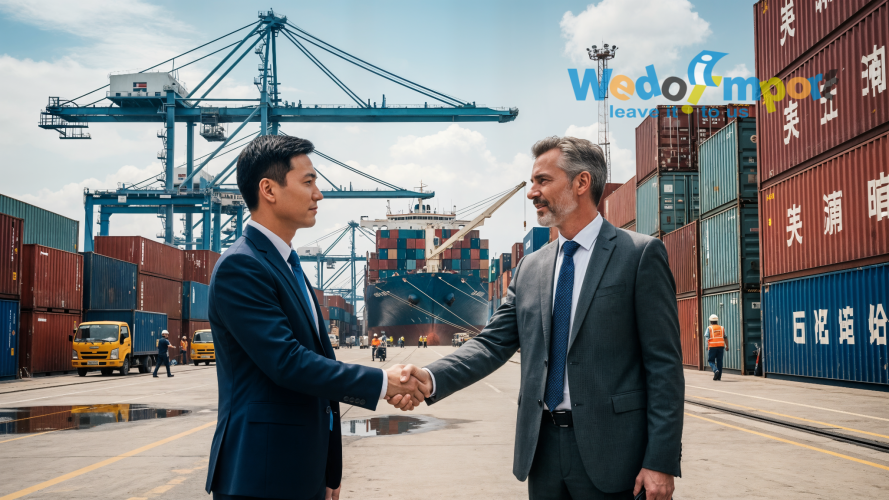
Importing Products from China: 5 Mistakes to Avoid | We Do Import
Importing products from China for your business can unlock tremendous growth, whether you’re sourcing from China, India, Vietnam, or other manufacturing hubs. However, navigating global supply chains without expert support often leads to costly mistakes. This is why hiring a professional sourcing agent can be a game-changer.
Why a Sourcing Agent is Essential for Successful Imports
A sourcing agent can act as your trusted partner on the ground. Here’s why businesses across the USA, UK, Europe, and Australia rely on sourcing agents when importing goods:
-
Local Expertise and Network: Sourcing agents know reputable manufacturers, wholesalers, and logistics providers in their regions.
-
Quality Assurance: They conduct factory audits, production monitoring, and pre-shipment inspections to ensure product quality.
-
Negotiation Power: With experience in local markets, they negotiate better pricing and terms than most buyers can achieve independently.
-
Reduced Risks: From compliance with import regulations to managing cultural differences, sourcing agents help you avoid hidden pitfalls.
-
Time and Cost Savings: They handle everything from sample approvals to shipping arrangements, freeing you to focus on growing your business.
Whether you’re importing textiles from India or electronics from China, working with a sourcing agent significantly improves efficiency and reduces headaches.
5 Common Mistakes Importers Should Avoid
You need to be mindful of frequent importing errors even when using a source agent. Keep an eye out for these five:
1. Not Verifying the Supplier’s Credentials
Many importers trust the first supplier they find online without due diligence. Always request certifications, business licenses, and references. A reputable sourcing agent can help validate supplier legitimacy.
2. Overlooking Product Compliance and Regulations
Every destination country has strict import standards. Failing to ensure compliance with safety, labeling, and documentation requirements can lead to delays or seizures. Before placing an order, confirm all regulatory obligations.
3. Neglecting Quality Control Inspections
Skipping inspections to save money is risky. Even experienced factories can have production issues. Conduct pre-production, in-line, and final inspections to catch defects early.
4. Underestimating Shipping and Customs Costs
Freight charges, customs duties, and taxes often exceed expectations. Always get detailed quotations and build contingencies into your budget. Your sourcing agent can advise on cost-effective shipping options.
5. Failing to Communicate Clearly
Vague specifications and inconsistent communication cause misunderstandings. Always provide detailed product requirements, timelines, and expectations in writing.
Importing products from China has become one of the most effective ways for businesses to expand their product range and stay competitive in the global market. China provides unparalleled diversity and economic advantages due to its vast number of manufacturers and suppliers. However, finding the right supplier and managing the complexities of international trade can be challenging without the right support. A trusted sourcing agent bridges the gap by handling supplier vetting, negotiations, quality inspections, and logistics, ensuring that your products meet your exact specifications and arrive on schedule.
Many new importers underestimate the importance of due diligence and clear communication when importing products from China. Without careful planning, it’s easy to encounter hidden fees, compliance issues, or delays that can disrupt your business. Partnering with experienced sourcing professionals not only saves time and money but also helps you build reliable, long-term relationships with reputable Chinese manufacturers. Whether you’re sourcing electronics, textiles, or custom products, working with a sourcing agent ensures your importing process is smooth, transparent, and profitable.
Pro Tip: Choose a Sourcing Agent Familiar with Your Market
Not all sourcing agents specialize in the same products or destinations. If you’re importing into the US or Europe, work with agents experienced in those markets. They’ll help you navigate compliance, tariffs, and logistics unique to your region.
Ready to Simplify Your Importing Process?
At We Do Import, we help businesses worldwide source quality products efficiently and safely. Whether you’re importing products from China, India, or other major manufacturing hubs, our experienced team is here to support your success. Get Started with Hassle-Free Imports Today. Contact us today!
FAQ’s
What is a sourcing agent?
A sourcing agent is a professional or company that helps businesses find suppliers, negotiate pricing, ensure product quality, and manage logistics.
Can a sourcing agent help negotiate better prices with Chinese suppliers?
Yes. One of the key benefits of using a sourcing agent is their ability to leverage local relationships and market knowledge to negotiate more favorable pricing, terms, and payment conditions.
Do I need a sourcing agent if I’m importing from China?
While it’s possible to source products independently, working with a sourcing agent in China helps minimize risks and ensures smooth transactions.
What is the best way to start importing products from China?
The best way to start importing products from China is to research and identify reliable suppliers, verify their credentials, and request product samples. Many importers also partner with a trusted sourcing agent who can handle negotiations, quality inspections, and logistics to ensure a smooth process.
How much does a sourcing agent in China typically charge?
Sourcing agent fees can vary depending on services and order volume. Some charge a percentage of the order value (commonly 3%–10%), while others work on a flat fee or retainer basis. It’s best to get clear pricing and a written agreement before starting your project.










Leave a Reply